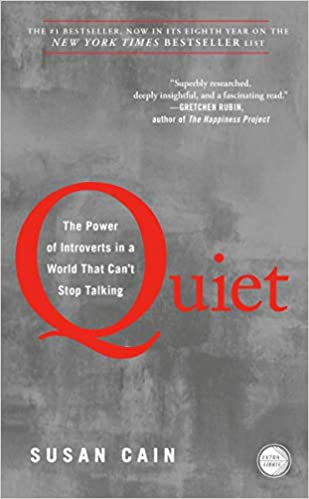The ultimate trigger for a shy person is being advised to speak up, but unlike what extroverts think, overcoming shyness and social awkwardness can be very difficult.
Shyness won’t go away overnight, and you shouldn’t change who you are all together. But there are some ways to stop that shyness from interfering with your life. Let’s get started!

Quiet
by Susan Cain
⏱ 13 minutes reading time
🎧 Audio version available
Avoid the “Shy” Label
Labels are hurtful. Labeling yourself as shy is like putting yourself in a bubble, and people can clearly see that bubble. This means that you’re not defining yourself as a unique individual and that a single trait is defining your entire personality.
Labeling yourself affects the way people treat you. Some people may latch on to that label and treat you differently. Even if someday you outgrow that bubble, people will still treat you as the “shy kid.”
Stop Sabotaging Yourself
Unfortunately, having a shy and awkward personality comes with multiple side effects. This is the dark side of a quiet disposition: the self-doubt, the questioning, the self-criticism, and a plethora of negative thoughts.
Shy people are their own worst enemy. We tend to sabotage our opportunities. If we’re in a new setting, our inner critic is somehow louder than the chance we could be taking. That voice tells you not to speak unless you want people to mock you. It tells you not to talk to that person because they’ll never like you.
Release that negativity, stop those train of thoughts right away. None of those things are true. Chances are, these people actually like you, or they haven’t gotten to know you well enough to have an opinion. And staying away from them because you’re afraid they may not like you is a waste.
There are so many opportunities and relationships you could be missing out on.
Coming up with a few positive affirmations to boost your self-esteem is right here. Tell yourself that you deserve to live your best life; you are powerful; you are unstoppable; you have so much to offer.
Tell yourself that you love and recept yourself. And people love you. The possibilities are endless in front of you.
Find the Reasons Why You’re Shy
Now, if you ever want to overcome your shyness, finding out why you’re shy in the first place is the right step. When you identify its root, you can finally become aware and accept who you truly are.
Often, shyness and an awkward demeanor come from childhood traumas or events that particularly stuck with us. Think about a defining moment in your childhood. Were your parents encouraging you to be quieter than speak up? Or were they shy themselves? Were your siblings domineering?
It’s important to explore the event that caused you to be this shy. Overcoming that memory makes you process what happened. Once you do, you may finally be able to move on with your life, untethered by that past event.
Explore Your Triggers
Every shy person knows that exact situation when your tongue gets tied up, you don’t know what to do with your arms, and you can’t connect with the people around you.
Find out what all your triggers are. Is it public speaking that has you breaking out in cold sweat? Is it raising your hand in class? Or asking a co-worker for help? When you identify what the triggers are, you can plan on what to do next. That’s something we’ll dive into in a minute.
But for now, every person has the trigger that makes them cringe. For example, public speaking is one of the most common. Their environment triggers people who have post-traumatic stress disorder. A bad memory can cause you to shrink in yourself and back into your comfort zone.
But here’s the good news. Chances are, you are not shy in every aspect of your life, in every situation. When you’re around your close family or friends, you probably feel fine.
Realizing that it may be a specific situation that’s making you shy is a turning point. When you identify your trigger, even if it takes time, you can take the necessary course of action to proceed.
Pen and paper; list all the social situations that cause you the most anxiety. You’re going to conquer them one by one.
Do you feel the most awkward when speaking to a large group of people, especially people you don’t know? Start small, engage in small talk with strangers, introduce yourself to them. Even if the first few introductions are a little awkward, even if your voice wasn’t loud enough, you’re getting better.
The more you put off or avoid social situations, especially triggering ones, the more your anxiety about them will grow.
What can you do? You can join a book club, a sports team– something that gets you out there, interacting with the community. When you join a club, you can meet new people who share the same interest as you. And bonus! With all of these new activities, you’re actively conquering another anxiety-inducing trigger: the fear of the unknown.
The important thing is to push yourself out of that comfort zone, not so much so that you feel dangerously uncomfortable but still making progress.
Do Research Ahead
There is something they don’t tell you about shyness. There is no magical, extroverted magical shot that you can take. And not one single website or blog or self-help book will give you a line-by-line script about what to say to the people in your life.
But here’s a loophole. You can have a course of action. This way, you have a blueprint or a layout of what you will do if faced with one of your triggers. Think of this as arming yourself with the information you need to keep the conversation flowing smoothly.
Have you ever experienced being on the outskirts of a conversation where people discuss a current event or scandal, and you don’t know who they’re talking about in the first place? Shy people, rise up. Your research skills are needed.
If it’s small talk at a party on the weekend that you’re stressing about, look up some trending or interesting topics. You won’t be able to carry cue cards or anything like that, but you’ll have the gist of the latest event, celebrity scandal, latest viral video, and et cetera, depending on the crowd.
Now, whenever one of those long stretches of silence occur, when you’re first trying to talk to someone or when you’re afraid you’re losing the interest of the person ahead of you, you have an entire arsenal of exciting things to talk about. Chances are, the person ahead of you knows something about it. If not, they’ll ask you to elaborate. Boom, you’re in a conversation.
Even just coming prepared will generally help with your confidence in these uncertain social situations.
Make Eye Contact
This is the last time you’ll walk away from a conversation and wonder if you even looked at that person for more than a second. People with social anxiety often struggle with making and holding eye contact. In time, and with more professional situations, suffering from anxiety in this context can eventually interfere with your everyday life.
Think about how unusual it will be to have an entire conversation with someone who’s not looking at you. It’s easy to lose yourself in the moment, but little do you know that you’re actually establishing a connection with the other person when you make eye contact.
Here’s a trick for maintaining eye contact. Hold eye contact for 50% while you’re speaking, and hold it for 70% while you’re listening. This nice variety displays an interest in the conversation and shows off your confidence.
Once you establish eye contact, hold it for 4 to 5 seconds. And if you feel the urge to break it, remember to look from side to side instead of looking down. It gives the sense that you lack confidence when you always look down during a conversation.
Smile More
Every shy person hates being told to smile, but did you ever notice one thing that all confident, self-assured people share? Their ability to show off a radiant smile. You have a beautiful smile, one that needs to shine more.
Not smiling can lead to most shy people being mislabeled as “standoffish.” It’s strange to be called “standoffish” when you’re more afraid of the person in front of you, but that’s how these actions are perceived.
Smiling, in general, has benefits for both you and others. It’s a charming way to acknowledge other people and a great conversation starter. When you show off those pearly whites, you’re showing that you are friendly, approachable, and willing to engage in a conversation. You could actually be making someone’s day better by smiling at them.
Related: How To Improve Communication Skills – 7 Unique Tips
Keep a Record of All Your Triumphs
Keep track of even the smallest triumphs in your journal, a simple smile you sent in the direction of a random person on your way to work is one for the books.
Those triumphs will add up, and flipping through the pages of all your social success is an incredible way to say motivated. Overcoming shyness is closer than ever, however long that timeline is. As long as you stick with this goal, you conquer your shyness.
Be Kind
Everyone tells you to be kind, but what’s just as important as being kind to yourself. Shy people are the champions of beating themselves up after an awkward social interaction. Waking up in the middle of the night and having that eye-widening moment of “why did I say that?” helps no one but makes you feel bad about yourself.
Overcoming shyness isn’t overnight. Keep in mind that regardless of how fast or slow your progress is, the most important thing is that you keep moving.
And you know what? That awkward situation that you keep mulling over, that you blush over whenever you think of it? No one but you is thinking about it that much. Think of a co-worker or a friend you have, and list the last five embarrassing situations you saw them experience. Chances are, you don’t have the answer to that. We are our own harshest critics.
What Is Snapreads?

With the Snapreads app, you get the key insights from the best nonfiction books in minutes, not hours or days. Our experts transform these books into quick, memorable, easy-to-understand insights you can read when you have the time or listen to them on the go.
